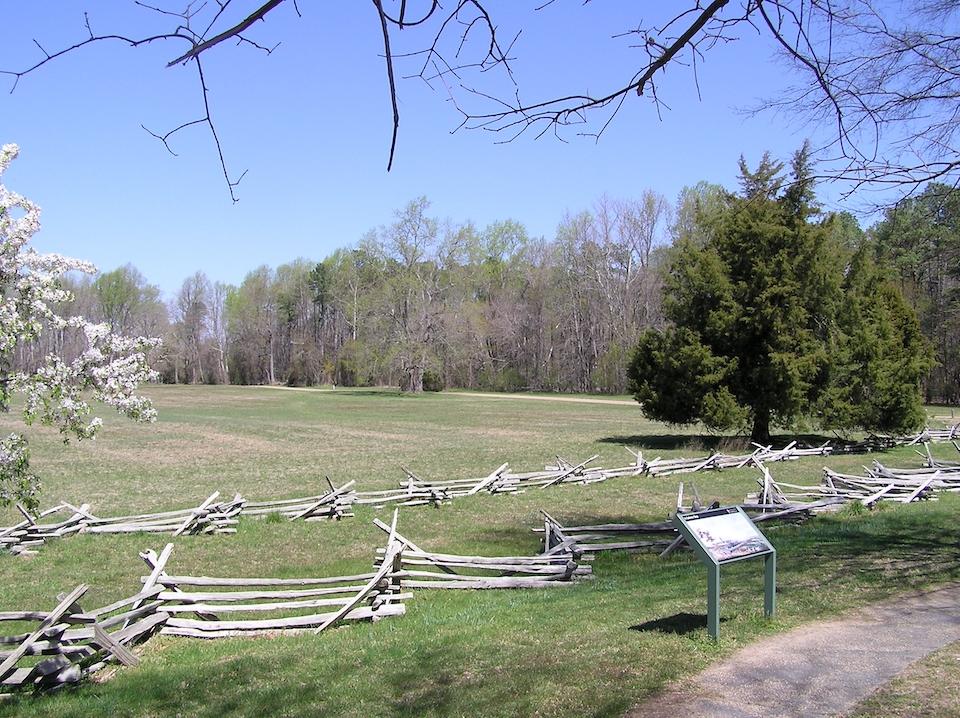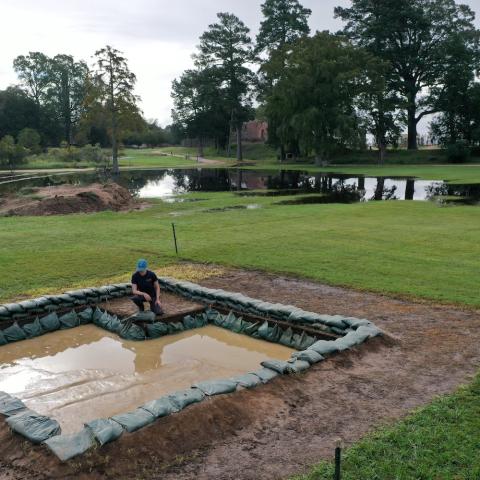
A filmmaker shooting in Colonial National Historical Park was practicing his First Amendment rights and didn't need a permit, a judge has ruled.
Editor's note: This updates with National Park Service reaction.
A federal judge has struck down as unconstitutional the National Park Service's practice of charging commercial filmmakers who want to shoot in the National Park System, ruling it is a protected activity under the First Amendment.
The ruling (attached below) by U.S. District Judge Colleen Killar-Kotelly stated that the permitting practice, through which the Park Service charged commercial filmmakers for a permit and any costs relating to park personnel assigned to monitor the filming or other cost recovery, "is an unconstitutional restriction on speech protected by the First Amendment."
"The statute imposes a chilling effect on the expressive activities of a wide swath of national park visitors," wrote the judge in her ruling Friday. "Consequently, there is a significant equitable interest in avoiding the unconstitutional application and enforcement of (the requirement) and its implementing regulations."
Congress in 2000 directed the secretaries of Interior and Agriculture "to require a permit and establish a reasonable fee for commercial filming activities or similar projects, as well as certain still photography activities, on federal lands under their respective jurisdictions. The law also directed the Secretaries to recover costs incurred by the agencies as a result of the permitted activity. Fees collected under this authority are to provide a fair return to the United States; be based, at a minimum, on certain listed criteria; and be retained by the Agencies to be available to the Secretary without further appropriation to be used consistent with the formula and purposes established for the Recreational Fee Demonstration Program."
The case was brought by Gordon M. Price, a Yorktown, Virginia, filmmaker who filmed settings in Colonial National Historical Park in Virginia for an independent feature called Crawford Road. The film revolved around "a stretch of road in York County, Virginia, that has long been the subject of rumors of hauntings and was the location of unsolved murders.”
Price, who didn't obtain a permit for filming in the park, debuted the production in October 2018 before an audience of about 250.
"The film garnered some attention in the local press and on social media sites," the judge noted in her ruling. "In December 2018, however, two NPS officers located Mr. Price at work and 'issued him a violation notice for failure to obtain a commercial filming permit.'"
In challenging the permitting requirement, Price pointed out that it does not apply to non-commercial filming, nor does it apply to news organizations. The absurdity of differentiating on the basis of whether a production was commercial didn't escape Judge Killar-Kotelly.
"For example, a 'non-commercial' filming production carried out by a non-profit organization or a news crew would escape the reach of (the) permitting regime, even if those groups used heavy filming equipment that damaged federal land," she wrote.
The permitting language carried no differentiation between large film crews with heavy equipment and small crews with no heavy equipment; Price used a single tripod with a camera and no more than four people.
"Defendants offer no explanation for how the broad sweep of this permitting regime is sufficiently tailored to the government’s goal of protecting federal land," noted the judge.
Judge Killar-Kotelly, in agreeing with Price, pointed out that the U.S. Supreme Court long has recognized film as being protected under the First Amendment, and that the high court "has found that 'the creation and dissemination of information are speech within the meaning of the First Amendment.'"
Taken in total, Price's "filmmaking at these parks constitutes a form of expressive speech protected by the First Amendment," she ruled.
In Washington, National Park Service officials were reviewing the judge's ruling "and determing the next steps," said Jenny Anzelmo-Sarles, the agency's chief of public affairs and chief spokesperson.
“This case started when the Park Service tried to criminally cite Gordon Price for unobtrusively making a film in a public park,” Price's attorney, Robert Corn-Revere, told the National Press Photographers Association. “But Gordon fought for his rights and prevailed. The court’s decision reaffirms that the act of filmmaking is protected by the First Amendment, and that the government cannot condition this right with arbitrary permit and fee requirements.”
The ruling did not apply to commercial still photography, however, as Price did not challenge that aspect of the Park Service permitting requirements.
In citing the permitting language applying to the Park Service's ability to recoup costs for damages inflicted during filming, the judge pointed out that "(W)hile the government and the public do have an interest in preserving federal lands, such an interest does not justify a widely over-inclusive law that infringes upon free expression. ...
"Moreover, the National Park Service has also shown itself capable of enacting regulations that preserve park resources without overly burdening expressive activity, and may continue to do so in ways that do not run afoul of the First Amendment," she held.


 Support Essential Coverage of Essential Places
Support Essential Coverage of Essential Places







Comments
This is actually good news for independent filmmakers that document nature.
I am surprised the Rangers went to those lengths to deliver a notice to the filmmaker. They probably earned 10X the amount of OT on this case than the park would have collected on a film permit fee.
My goodness, for those of us who know of this judge and her long and increasingly quirky history, this is one more convoluted ruling, not entirely or always bad, but convoluted, increasingly convoluted in recent years. Let's try to unpack this one.
As this article reports, a permit is or was required for commercial filmmaking in a national park. The primary purpose of requiring such permit is or was, at least in part, to alert park staff to monitor the filming activities, assess any associated visitor disturbances or resource damage, determine any required mitigation, and be there to establish any resulting need for cost recovery. Another purpose of requiring such permit is or was to collect a reasonable fee to reimburse the NPS for the added staff workload associated with all of the above.
Now, Judge Killar-Kotelly has ruled that commercial filmmaking in a national park is protected under the First Amendment, that "filmmaking at these parks constitutes a form of expressive speech protected by the First Amendment," and that it's unconstitutional to require commercial filmmakers to obtain any permit or pay any fee for such permit. However, the judge did not extend her ruling to commercial still photography, which still requires a permit. Hmmm...
With regard to the fact that noncommercial filming carried out by a nonprofit organization or a news crew would not require a permit even if such filming also disturbed other visitors or involved heavy filming equipment that damaged park resources, the article correctly notes the absurdity of differentiating on the basis of whether a production is or is not a commercial enterprise. However, instead of invoking standard administrative protections against arbitrary and capricious regulations, Judge Killar-Kotelly once again overreached, once again used a bazooka when a fly swatter was needed, and with great theatrical flourish invoked the First Amendment.
So, why am I not reaching for my MAGA hat and my Gadsden flag and cheering this protection of my free speech rights? ...well, because the parks actually do need to know when a film crew, commercial or otherwise, is going to be active in the parks. The NPS needs to know for the very reasons listed above ...because they need to monitor the activities, assess any associated visitor disturbances or resource damage, determine any required mitigation, and be there to establish any resulting need for cost recovery ...and because they need a mechanism to collect a reasonable fee for the added staff workload associated with all of the above, all of which is also why they have fishing regulations and charge a fee for fishing licenses. I pay it as a civic duty and without giving them any gruff.
Was there cause to strike the regulations that Judge Killar-Kotelly ruled against? Yes, the regulations were overly broad, inadequately focused, arbitrary and capricious and needed to be rethought, revised, and reworked. Is this really the place to invoke the First Amendment? ...only in the minds of judges like this one and a few other quirky folks.
Over the decades at Mount Rainier, back when something called magazines were common, I noticed perhaps a dozen full-page glossy ads (usually for cars & trucks), where the scenic image was reversed. I'm only just realizing that was probably intentional to avoid permits and fees.
So Hollywood now can just show up at an NPS site, unannounced, film for hours, days or weeks, trampse wherever they like with their equipment, be totally unsupervised by park staff and pay nothing?
Why should someone be allowed to use properties and facilities paid for by taxpayers for personal gain without payment? If an individual wants to go to a National Park property and uses the facilities he/she pays a fee. Camping, pay the fee. Parking, pay the fee. Admission to a site, pay the fee. This is one of the ways the location(s) gain finances to maintain.
On the other hand, without a permit, the Park Service does not have to acknowledge the filmmakers presence, including crowd control or security for the chosen location.
I'm shocked there are actually people defending the national park service... The permits where a cash grab and nothing else. We all already pay for the national parks with out tax dollars.
They have to pay private landowners, because they make a huge profit for minimal. They are conducting a business with a huge profit they need to pay.